How can we tackle packaging waste?
First of all, do we really need packaging? The short answer is no. We should embrace the idea that minimal or no packaging is better than any packaging material, and we should strive to find pack-free solutions. However, removing packaging is not always possible, especially for food packaging. That’s when we start looking at circular packaging solutions that prioritise reusability, and some remarkable innovators in this field are already leading the way.
Further, what about products that need to have a packaging which can not be reused? In that case the focus should be on recycled and easily recyclable or compostable packaging. However, we must be cautious about such claims and assess how they align with reality, particularly in the case of compostability. While packaging that becomes again part of nature may seem like an exciting solution, we must acknowledge that industrial composting facilities are not that widespread or energy-efficient, at least for now, and home composting is not always possible.
What is the ideal packaging material?
The question of finding the ideal packaging material is complex and we believe that a straight answer to this question is simply not possible. You need to consider and analyse the issue on a case by case base.
Approximately 36% of plastics are utilised in packaging, with single-use plastics predominantly coming from fossil fuels, leading to significant CO2 emissions. While we look to combat plastic pollution, it may seem that any plastic-free option is superior, the reality is that some alternative materials used have an environmental footprint up to 3 times higher. Lastly we need to consider that recycling practices vary widely among countries and even between municipalities, affecting the actual recycling rates of “recyclable” materials. This means that knowing how to do take the best choice is not easy, but a good life cycle assessment (LCA) and science based insights are a great start.
Want to get inspired by 5 innovators?
1. Olive
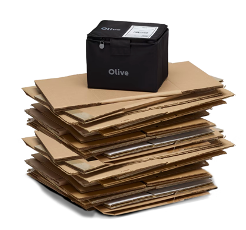
Image Source: https://www.shopolive.com/
“Unboxing” your e-commerce experience. Olive delivers e-commerce products using reusable bags and picks up returns for free. Customers that are not returning any item have the option to send back pre-loved items to be sold on Olive’s platform. Olive was founded by an e-commerce expert founder of Jet.com and ex-vice president of Walmart supply chain.
Key Info
- Type: Reusable cardboards
- Location: United States
- Website: www.shopolive.co
2. Bumerang
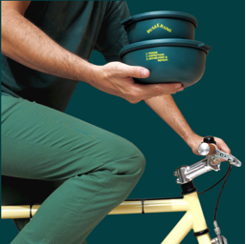
Image Source: https://www.youbumerang.com/en
Takeaways guilt free. Bumerang partners with local restaurants to make the takeaway experience waste free. Customers can order takeaways using the Bumerang code in the app and have 15 days to return the packages to one of the locations in the Bumerang network. Their mission is to eliminate disposable, single-use containers and opt for reusable ones for food takeaways and delivery orders.
Key Info
- Type: Reusable takeaway boxes
- Location: Spain
- Website: www.youbumerang.com
3. IUV
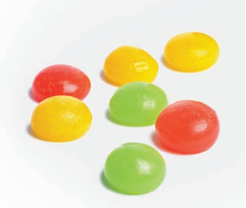
Image Source: https://www.iuvcompany.com/
Will you eat the packaging? IUV creates edible coatings to reduce food waste and plastic consumption. These coatings are obtained from water-based coating formulations. Plus these coatings can be added to probiotics and prebiotics. The solution can be applied to solid foods or drinks.
Key Info
- Type: Edible coatings
- Location: Italy
- Website: www.iuvcompany.com
4. Katch
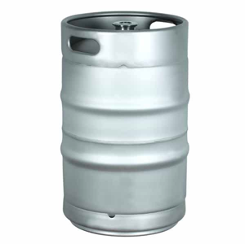
Using IoT to track beer kegs. Katch found that lost kegs cost the global industry over $300 million every year. They partner with breweries using data-driven analytics to get kegs of fresh beer to market and efficiently return them back.
Key Info
- Type: Smart Beer Kegs
- Location: Australia
- Website: www.katchassets.com
5. Loop by Terracycle
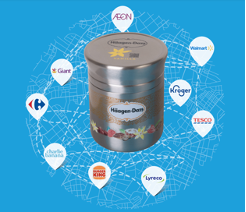
Image Source: https://exploreloop.com/
A global reuse network of manufacturers, retailers, and consumers. Major brands are already using Loop to move away from single-use products by recycling, refilling or reusing them. Loop works with a wide range of products from cups of coffee to shampoo bottles. Reusable products can be purchased and dropped by any location that is part of the network.
Key Info
- Type: Refillables network
- Location: United States
- Website: www.terracycle.com
Source: